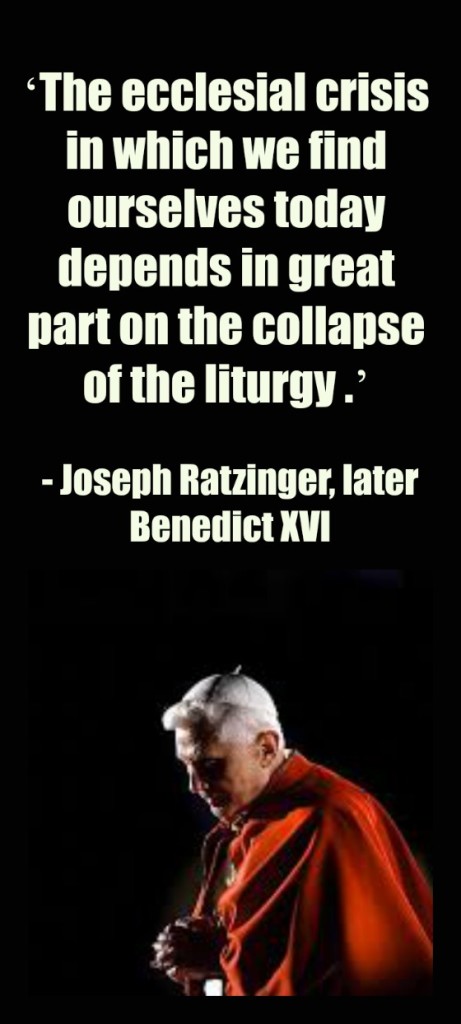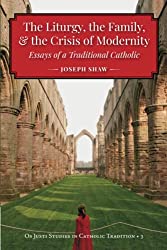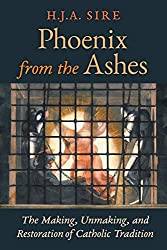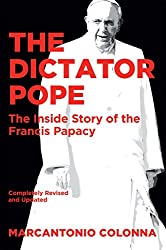How to speak of the unspeakable? In this case, unspeakable beauty …
Here is the question I face when considering not only the beauty, but also the power and necessity of true liturgy within the Church.
For it is a necessity that appears truly desperate, given the terrible crisis of the Church since the 1960s, when (not coincidentally I think) the liturgy changed more dramatically than at any point in its history …
And how to speak of unspeakable power and unspeakable need?
Here is the problem I faced when I recently engaged in an online discussion regarding some remarks from Fr. Dwight Longenecker concerning the new liturgy.
In those remarks, Fr. Longenecker had said:
The reason the Novus Ordo so often seems irreverent is not any intrinsic deficit in the Novus Ordo. (Otherwise why would Holy Church say that it remains the Ordinary Form of the Mass?) Instead the Novus Ordo is sometimes celebrated irreverently because people regard the Mass as a celebration of their social activism, or a community festival to increase their self esteem or a sentimental, individualistic, spiritual comfort session.
And in the online discussion (here) I wrote :
I am concerned that Fr. Longenecker has closed the door to deeper dimensions here …
The first sentence [i.e. in the above] seems far too categorical to me, as though he may not willing to struggle with the possibility there even could be a deficit. The second sentence only closes the door further. Unsurprisingly, the third shows no inclination to look deeper.
Personally, I had to struggle with this issue for many years. I was/am married to a woman who is far, far more liturgically sensitive than I am. Things I would never have noticed left her reduced to tears. I didn’t mind the OF (and still don’t when you have a truly reverent priest). But I had to ask which is right: my ‘not minding’ or my wife’s reactions (that originally seemed extreme to me).
Out of years of struggle, I have come to the conclusion that there is an intrinsic deficit. One of the most obvious things here is that a priest facing the congregation cannot pray as easily. Whilst some priests can remain prayerful, for others, the temptation to become an entertainer, comedian, cheerleader, singer-star is just too great. I have witnessed appalling examples of this scores of times in thousands now of daily Masses across several countries. …
But apart from this more obvious factor of the potential for prayerfulness with ad orientam, there are many, many less obvious factors, which I now believe my wife was sensitive to, whilst I was obtuse.
Given the crisis of the Church, we cannot close the door on the notion that part of the problem, at very least, is what Fr. Longenecker spurns – that there is an intrinsic deficit here.
After saying that, further discussion ensued. Very good points were made by others. But, speaking personally, none of the points addressed the heart of the matter. (This certainly includes the ones I made, like the one above about the versum populorum temptation to become an entertainer!)
But, then, it is profoundly difficult to get to the real heart of this matter with arguments and counter-arguments based on empirically observable things – such as a priest behaving like a pop star or comedian. Or even a French bishop I once saw tapping his crozier to a rock beat he was playing at the Mass …
That French bishop still makes me shudder. But my invoking him here still does not get to the heart of the matter.
For the Mass is a mystery and a mystery is beyond all empirical observation.
Empirically, we can observe certain things that seem to result from the new Mass. ‘Crozier rock’ is certainly one example! And I could cite many more. But none of these are necessarily convincing on an empirical plane where argument and counter-arguments can continue indefinitely.
For me, it is a matter of interior conviction of the heart. As I said in the online discussion, I became convinced only after years of struggle. These were years whilst I went simultaneously to both forms of the Mass and observed my interior experience of both side by side. Indeed, I still go to both forms and observe side by side …
These were years whilst I also struggled with what to do with my wife Kim’s tears. (Was she being extremist or was she awake to things I was too dense to see?)
But neither Kim’s interior experience, nor my own can – or should be! – convincing for anyone else.
In other words, dear Reader, I can report my interior conviction based on years of struggling with these things. But I know this is worth little indeed.
What is definitely of more worth, however, is to turn to a man as profound as Joseph Ratzinger, now our Pope Emeritus Benedict XVI.
Because when I consider the life-trajectory of Joseph Ratzinger – from ‘pioneering’ liberal at Vatican II to brilliant head of the CDF to the Papacy – I know that Ratzinger struggled in his heart with these issues in a far, far, far more profound and intensive way than I shall ever come close to.
These decades of struggling with a Church in crisis were enough to produce conviction in Ratzinger’s heart. Thus in his autobiographical book Milestones, Ratzinger once said:
I am convinced that the ecclesial crisis in which we find ourselves today depends in great part upon the collapse of the liturgy.
In the same book, Ratzinger also wrote:
I was dismayed by the banning of the old Missal seeing that a similar thing had never happened in the entire history of the liturgy….
The promulgation of the banning of the Missal that had been developed in the course of centuries. starting from the time of the sacramentaries of the ancient Church, has brought with it a break in the history of the liturgy whose consequences could be tragic….
The old structure was broken to pieces and another was constructed admittedly with material of which the old structure had been made and using also the preceding models….
But the fact that [the liturgy] was presented as a new structure, set up against what had been formed in the course of history and was now prohibited, and that the liturgy was made to appear in some ways no longer as a living process but as a product of specialised knowledge and juridical competence, has brought with it some extremely serious damages for us [Italics added].
In this way, in fact, the impression has arisen that the liturgy is ‘made,’ that it is not something that exists before us, something ‘given,’ but that it depends on our decisions.
It follows as a consequence that this decision-making capacity is not recognized only in specialists or in a central authority, but that, in the final analysis, each ‘community’ wants to give itself its own liturgy.
But when the liturgy is something each one makes by himself, then it no longer gives us what is its true quality: encounter with the mystery which is not our product but our origin and the wellspring of our life….
Encounter with the mystery … with these words Ratzinger brings me back to my point above.
No purely rational or empirical arguments can ever address this mystery. Truly, I often feel that I am doing no more than stammering at this blog …
But sometimes it is better to stammer than not to speak at all. And, stammeringly, I say I know my own interior experiences at the Mass or my wife’s count for nothing at all in this matter.
However, Joseph Ratzinger’s life represents a vast, intensive crucible of experience with the crisis of the Church.
Whereas Father Longenecker closes the door with his three simple sentences above, Ratzinger, it seems to me, entered into the crisis of the Church with the most profound intensity over decades.
And thus when he finally became Pope, he devoted himself tirelessly to the issue of the Latin Mass. I refer here not only to Summorum Pontificum liberating the Tridentine liturgy, but also the following document Universae Ecclesiae which sought to clarify it after the world and much of the Church dissented.
But it does not stop there. Benedict XVI was working to restore the semi-schism within the SSPX from the beginning of his papacy until – incredibly! – the very last fortnight. For this he brought down the world’s scorn on his weary, lonely shoulders …
Less controversially, he also provided for the (Latin Mass) Institute of the Bon Pasteur and did much else besides for the liturgy.
For example, Charles A. Coulombe writes of how:
[Benedict XVI] resolved to make of Papal liturgies an example for all others to follow.
So he replaced the crucifix at the center of the high altar at St. Peter’s; gave out Communion on the tongue to kneeling recipients; made room for periods of silence at every Papal Mass; expanded the use of Latin and in general fostered beauty at every liturgical function – in marked contrast to what perhaps the vast majority of Catholics encounter in their parish churches.
Benedict also gave the lead for the parishes when he restored his private chapel – ironically called the ‘Pauline chapel’ (after Pope Paul III who founded it) – to its pre-Paul VI state, restoring the marble altar to its former place against the wall so that the Pope could offer the Mass facing eastwards.
(Note: the above is taken from Coulombe’s excellent small book The Legacy of Pope Benedict XVI which I have reviewed here with much more quoted material regarding this Pope’s effort to restore tradition.)
Yes, Coulombe’s book is invaluable indeed for understanding Ratzinger’s priorities …
But again I wander away from the heart of the matter. I could stammer more. But I think I shall simply close by saying …
Father Longenecker, I beg you, please do not close the door.
And whoever you are, please do not close the door, if you care about the fate of the Church.
The stakes are too, too high. The Church is falling apart (although, for now, we will restrain ourselves from commenting on the current Synod).
But if you care about the fate of the Church, do not listen to my puny experience. But I do beg you to listen to the experience and testimony of one such as Benedict XVI.
Moreover, I beg you to listen your own experience of the traditional liturgy, if you have not closed the door on that.
Seek out the traditional liturgy and listen to what your heart says.
(A final note and qualifier here: Here in Ireland and elsewhere, I often find that priests who are inexperienced with the Latin Mass often fail to realise its full depths. It is no fault of their own, but the terrible times we are in. Still, I recommend experienced groups like the Institute of Christ the King, as I have done here.)
Foreword for Monarchy by Roger Buck
Buying Books at Amazon Through These Links Gives Us a Commission. This Supports Our Apostolate. Thank You if You Can Help Us Like This!









